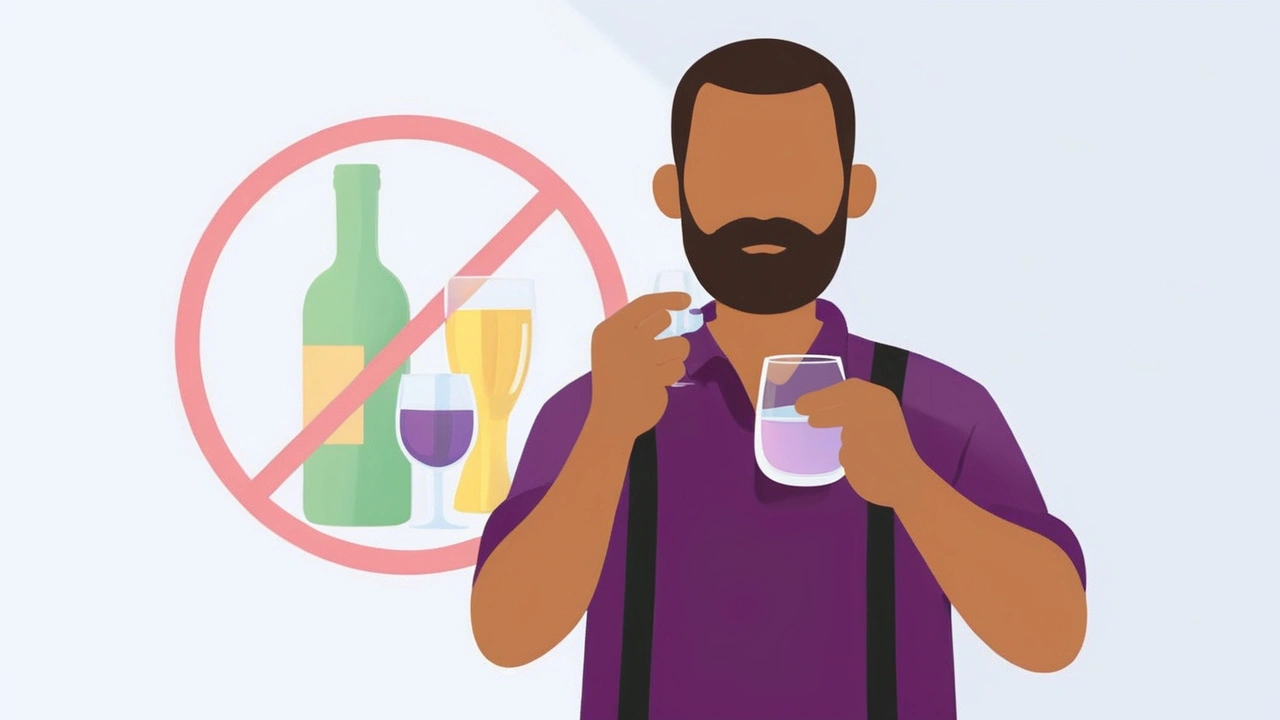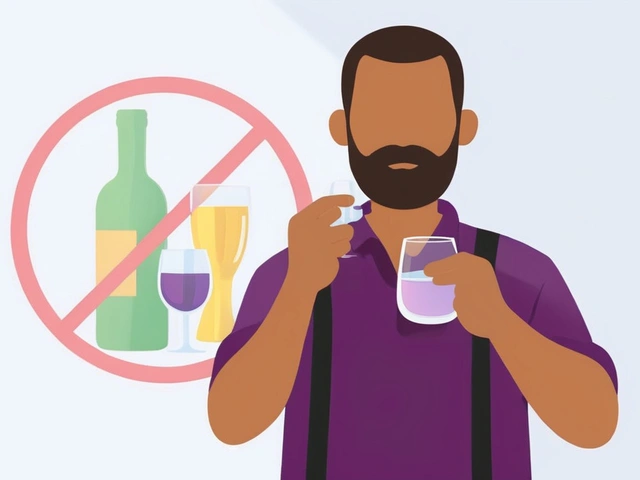The Importance of Avoiding Alcohol with Antibiotics
The relationship between alcohol and antibiotics can be a confusing subject, with many myths and misconceptions circulating. Dr. Colleen Clayton, a primary care provider from the Cleveland Clinic, emphasizes the importance of avoiding alcohol during antibiotic treatment. While moderate alcohol consumption may not significantly reduce the effectiveness of most antibiotics, it can still pose several health risks and complicate the recovery process.
Potential Health Risks Associated with Alcohol and Antibiotics
Alcohol consumption can delay recovery when you're on antibiotics. Liquor can impair the immune system, making it harder for your body to fight off infections. Furthermore, alcohol can cause dehydration, which exacerbates the side effects of both the alcohol and the antibiotics. This can result in symptoms such as dizziness, headaches, and even more severe manifestations like kidney damage. Another risk is that alcohol can disrupt your sleep patterns, which are crucial for recovery. A lack of sleep can weaken your immune system, slowing down the healing process.
Specific Antibiotics and Severe Reactions
It’s important to note that not all antibiotics have the same interaction with alcohol. Some can lead to severe reactions when mixed with alcohol. Notably, metronidazole and tinidazole are two antibiotics that can cause acute adverse reactions if taken alongside alcohol. The effects can be quite severe, including nausea, vomiting, and even diarrhea. These reactions can occur quickly and can be intense, making the experience extremely unpleasant and potentially dangerous. Therefore, it is highly advisable to stay away from alcohol completely when undergoing treatment with these specific antibiotics.
Duration of Abstaining from Alcohol
Another critical point Dr. Clayton mentions is the need to wait at least 72 hours after completing a course of antibiotics like metronidazole or tinidazole before resuming alcohol consumption. The remnants of these medications can still interact with alcohol, leading to potential adverse effects even after you’ve finished the course. This period allows your body to clear out the antibiotics, ensuring a safer return to a normal lifestyle that may include alcohol.
General Guidelines for Other Antibiotics
For most other antibiotics, moderate alcohol use does not severely impact their effectiveness, but caution is still advised. For instance, Bactrim, which contains sulfamethoxazole and trimethoprim, can cause less severe but still uncomfortable reactions like nausea and dizziness when combined with alcohol. Given that antibiotics are prescribed to fight infections, impairing your body's ability to recover by introducing alcohol into your system is generally not a prudent choice. On top of that, dehydration caused by alcohol can intensify some side effects of these drugs, making your recovery process longer and potentially more complicated.
Antibiotic Prescriptions and Healthcare Perspectives
Every year, healthcare providers write over 200 million antibiotic prescriptions. This statistic underscores the widespread use of these essential medications in combating various infections and diseases. However, antibiotics should be taken responsibly to ensure their effectiveness and to avoid complications. Healthcare professionals, including Dr. Clayton, advocate for complete transparency and caution when it comes to mixing alcohol with antibiotics.
Conclusion: Best Practices for Recovery
To ensure a smooth and effective recovery while on antibiotics, it’s best to avoid alcohol until you’ve completed your medication course. This is especially crucial for those taking specific antibiotics like metronidazole or tinidazole, which have more severe reactions with alcohol. By understanding and adhering to these guidelines, you can help your body recover more efficiently, ensuring that the antibiotics can work their magic without interference from alcohol.
Your health should always be a priority. Following these expert recommendations can make a significant difference in how quickly and effectively you recover from your illness. Stay informed and make conscious choices to support your well-being.





KJ Miller
August 1, 2024 at 01:15Honestly, I always avoid alcohol when I'm sick anyway. It's not just about antibiotics-it's about giving your body the best shot at healing. Sleep, hydration, and rest? Non-negotiable. 🍷❌
Erin DeGroot
August 1, 2024 at 12:48I used to think it was just a myth-until I drank a beer while on metronidazole. Let's just say I learned the hard way. Nausea, sweating, heart racing-like my body was staging a revolt. Never again.
Claire Battista
August 2, 2024 at 07:52This is such a needed reminder. So many people think 'it's just one drink' and don't realize how much it messes with recovery. I always tell my patients: your body's fighting a war. Don't hand the enemy more ammo.
Frank De Silva
August 3, 2024 at 04:22Let's be real-this is just another medical overreaction. Most antibiotics don't interact dangerously with alcohol. The real issue? People who can't control their drinking. Blaming the medicine instead of the behavior is lazy.
Stephanie Bryant
August 4, 2024 at 03:21Bactrim + alcohol = my worst night ever. Like, I thought I was gonna die. I was dizzy, puking, felt like my head was a balloon. I swear I'll never do it again. Doc said '72 hrs after'-I waited 96. Better safe than sorry 💊😵
Drashti patel
August 4, 2024 at 20:04In my culture, we use alcohol as medicine too. But even we know-when the body is weak, you don't pour poison on the wound. It's not about fear. It's about respect. For the medicine. For the illness. For yourself.
Kaitlin Crockett
August 4, 2024 at 21:38Metronidazole is the only one that really matters. Everything else is just 'maybe.'
Tracy Blake
August 5, 2024 at 04:00You know, alcohol isn't just a chemical-it's a social ritual, a cultural artifact, a psychological crutch. When we say 'don't drink while on antibiotics,' we're not just talking pharmacology. We're talking about surrendering control, confronting vulnerability, and choosing healing over comfort. The body doesn't heal in a vacuum. It heals in the context of choice. And sometimes, the most radical act of self-care is saying no to the thing that feels like a friend.
Leo Lee
August 5, 2024 at 23:27This is why Americans overmedicalize everything. In Europe, people drink wine with their pills. No one dies. Stop scaring people with fear-mongering. It's not 1950s propaganda.
Isabel Piaggi
August 6, 2024 at 04:14i read somewhere that even a sip of beer can mess with liver enzymes when u r on abx and i was like ohhhhhhh so thats why i felt so bad last time lol
Tom McInnes
August 6, 2024 at 08:40The recommendation is prudent. The science is clear. No need for drama.
Stephanie Cepero
August 6, 2024 at 23:45I just finished a course of amoxicillin, and I didn't touch a drop of alcohol... and honestly? I felt better faster. Like, my energy came back quicker. I didn't even realize how much I was dragging until I stopped drinking. So... yeah. Just say no.
Michael Tribone
August 7, 2024 at 16:35You got this! Your body’s working overtime-give it the VIP treatment. Skip the drinks, sleep hard, drink water, and you’ll be back to your awesome self before you know it. 🙌💪
Nancy Lowry
August 8, 2024 at 10:04If you're drinking while on antibiotics, you're not just being irresponsible-you're endangering others. You're not just risking your own recovery, you're risking spreading the infection longer because you're too lazy to follow basic medical advice. Wake up.
Khanyisa Mhlongo
August 9, 2024 at 06:15In South Africa, we say 'Ubuntu'-I am because we are. So when you drink while sick, you're not just hurting yourself-you're making your family, your community, your healthcare system work harder. That’s not cool. I skip the booze, I sip tea, I rest. Simple.
Manvika Gupta
August 9, 2024 at 13:32i always wait 3 days after last pill even if its not metronidazole just bc why risk it lol
Chloe McDonald
August 9, 2024 at 13:41I used to drink every night. Now I don’t even think about it when I’m on antibiotics. It’s just part of the routine now. Feels good to be intentional.
Hobert Finn Bodfish
August 10, 2024 at 03:58You people are so paranoid. I’ve had 12 antibiotics in the last 5 years and drank every time. Still here. Still healthy. Your fear is your own problem. 🤷♂️
Andrea Galetto
August 11, 2024 at 01:14If you need a drink to get through being sick, you have bigger issues than antibiotics.
Daniel Rogers
August 11, 2024 at 10:17You’re not just healing your body-you’re rebuilding your discipline. Every time you choose water over wine, you’re telling yourself: 'I’m worth the effort.' Keep going. You’re crushing it. 🎯